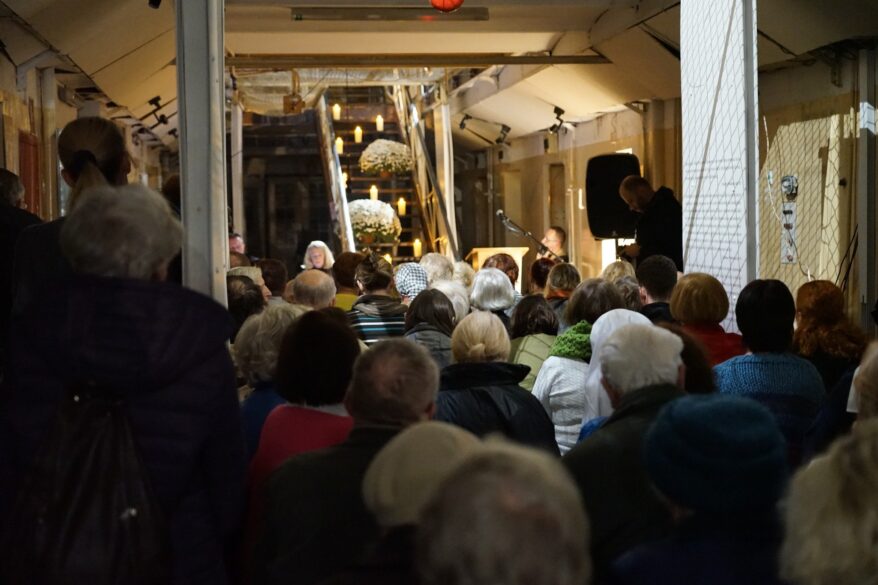EN EL EXILIO
Por Ron Rolheiser
A veces somos más útiles y vivificantes en los momentos en que estamos más indefensos. Todos hemos estado allí. Estamos en un funeral y no hay nada que se pueda decir para aliviar el dolor de alguien que ha perdido a un ser querido. Nos sentimos incómodos e impotentes. Nos gustaría decir o hacer algo, pero no hay nada que decir o hacer, más que estar ahí, abrazar a quien sufre el dolor y compartir nuestra impotencia. Puede parecer extraño, pero es nuestra propia impotencia lo que resulta más útil y generativo en esa situación. Nuestra pasividad es más fructífera y generativa que si estuviéramos haciendo algo.

Vemos un ejemplo de esto en Jesús. Dio su vida y su muerte por nosotros, pero en momentos separados. Él dio su vida por nosotros mediante su actividad y su muerte por nosotros mediante su pasividad, es decir, mediante lo que absorbió en el desamparo. De hecho, podemos dividir cada uno de los evangelios en dos partes claras. Hasta su arresto en el huerto de Getsemaní, Jesús es el activo: enseña, cura, hace milagros, alimenta a la gente. Luego, después de ser arrestado, no hace nada: lo esposan, lo llevan, lo juzgan, lo azotan y lo crucifican. Sin embargo, y este es el misterio, creemos que él nos dio más durante ese tiempo en el que no pudo hacer nada que durante todos esos momentos en que estuvo activo. Somos salvos más por su pasividad e impotencia que por sus poderosas acciones durante su ministerio. ¿Cómo funciona esto? ¿Cómo pueden ser tan generativos el desamparo y la pasividad?
En parte esto es misterio, aunque en parte captamos algo de ello a través de la experiencia. Por ejemplo, una madre amorosa que muere en un hospicio, en coma, incapaz de hablar, a veces en esa condición puede cambiar los corazones de sus hijos más poderosamente de lo que jamás pudo hacerlo durante todos los años en los que hizo tanto por ellos. ¿Cuál es la lógica aquí? ¿Con qué metafísica funciona esto?
Permítanme comenzar de manera abstracta y rodear esta pregunta antes de aventurarme a dar una respuesta. Los pensadores ateos de la Ilustración (Nietzsche, Feuerbach, Marx y otros) ofrecen una crítica muy poderosa de la religión y de la experiencia religiosa. Desde su punto de vista, toda experiencia religiosa es simplemente una proyección subjetiva, nada más. Para ellos, en nuestra fe y prácticas religiosas, siempre estamos creando un Dios a nuestra imagen y semejanza, para servir a nuestros propios intereses. (La antítesis misma de lo que creen los cristianos.) Para Nietzsche, por ejemplo, no hay ninguna revelación divina que venga de fuera de nosotros, ni ningún Dios en el cielo que nos revele la verdad divina. Todo somos nosotros, proyectando nuestras necesidades y creando un dios para servir esas necesidades. Toda religión es una proyección humana y egoísta.
¿Qué tan cierto es esto? Uno de los profesores más influyentes con los que he estudiado, el jesuita Michael Buckley, dice lo siguiente frente a esa crítica: Estos pensadores tienen un 90% de razón. Pero están equivocados en un 10%, y ese 10% marca la diferencia.

Buckley hizo este comentario mientras enseñaba lo que Juan de la Cruz llama una noche oscura del alma. ¿Qué es una noche oscura del alma? Es una experiencia en la que ya no podemos sentir a Dios imaginativamente o sentir a Dios afectivamente, cuando el sentido mismo de la existencia de Dios se seca dentro de nosotros y nos quedamos en una oscuridad agnóstica, incapaces (en la cabeza, el corazón y las entrañas) de evocar cualquier sentido de Dios.
Sin embargo (y este es el punto, precisamente porque estamos indefensos e incapaces de evocar conceptos imaginativos o sentimientos afectivos sobre Dios), Dios ahora puede fluir puramente en nosotros, sin que podamos colorear o contaminar esa experiencia. Cuando todos nuestros esfuerzos son inútiles, la gracia finalmente puede tomar el control y fluir hacia nosotros en pureza. De hecho, así es como toda revelación auténtica entra en nuestro mundo. Cuando la impotencia humana nos vuelve incapaces de hacer que Dios sirva a nuestro propio interés, Dios puede entonces fluir en nuestras vidas sin contaminación.
Ahora bien, esto también es válido para el amor humano. Gran parte de nuestro amor mutuo, sin importar nuestra sinceridad, está teñido de interés propio y, en algún momento, es egoísta. De alguna manera, inevitablemente formamos a aquellos que amamos a nuestra imagen y semejanza. Sin embargo, como ocurre con la crítica de Buckley a los pensadores ateos de la Ilustración, este no es siempre el caso. Hay ciertas situaciones en las que de ninguna manera podemos manchar el amor y convertirlo en algo egoísta. ¿Cuáles son esas situaciones? Precisamente aquellos en los que nos encontramos completamente indefensos, mudos, tartamudos, incapaces de decir o hacer nada que sea útil. En estas “noches oscuras del alma” particulares, cuando somos completamente incapaces de darle forma a la experiencia, el amor y la gracia pueden fluir pura y poderosamente.
En su obra clásica El Medio Divino, Pierre Teilhard de Chardin nos desafía a ayudar a los demás tanto a través de nuestra actividad como de nuestra pasividad. El tiene razón. Podemos ser generativos a través de lo que hacemos activamente por los demás, y podemos ser particularmente generativos cuando permanecemos pasivamente junto a ellos en su impotencia.
(El padre oblato Ron Rolheiser es teólogo, maestro y autor galardonado. Se le puede contactar a través de su sitio web www.ronrolheiser.com. Facebook/ronrolheiser)


